ASTANA – President of Kazakhstan Kassym-Jomart Tokayev paid a state visit to Qatar on Feb. 13-14, signaling a growing interest in bolstering ties between the two nations and resulting in the signing of commercial agreements worth nearly $18 billion. This visit, which comes at a time of shifting geopolitical dynamics, particularly within the Gulf region, reflects Kazakhstan’s decades-long multivector and balanced foreign policy and also facilitates the bridge between Central Asia and the Gulf region.

President Tokayev paid a state visit to Qatar on Feb. 13-14. Collage is created by The Astana Times. Photo credit: Akorda press service
Historical significance
In 2023, Kazakhstan and Qatar celebrated 30 years of diplomatic ties, which began on July 1, 1993. The Embassy of Kazakhstan in Doha was opened in May 2007, and Qatar’s Embassy in Kazakhstan unveiled its doors in March 2008.
The bilateral ties are characterized by frequent high-level contacts. From 2019 to 2023, there were eight phone conversations between Kassym-Jomart Tokayev and Emir of Qatar Sheikh Tamim bin Hamad Al-Thani.
Besides multiple meetings on the sidelines of international venues, such as the Qatar Economic Forum in Doha in June 2022 and the 77th session of the United Nations General Assembly in September 2022, the Emir of Qatar also paid a state visit to Kazakhstan in October 2022 to attend the sixth summit of the Conference on Interaction and Confidence Building Measures in Asia (CICA).
In June 2023, he traveled to the Kazakh capital to attend the Astana International Forum.
Strategic partnership
As part of his packed visit, President Tokayev met with the Emir of Qatar Sheikh Tamim bin Hamad Al-Thani, and the Prime Minister and Foreign Minister Sheikh Mohammed bin Abdulrahman Al-Thani.
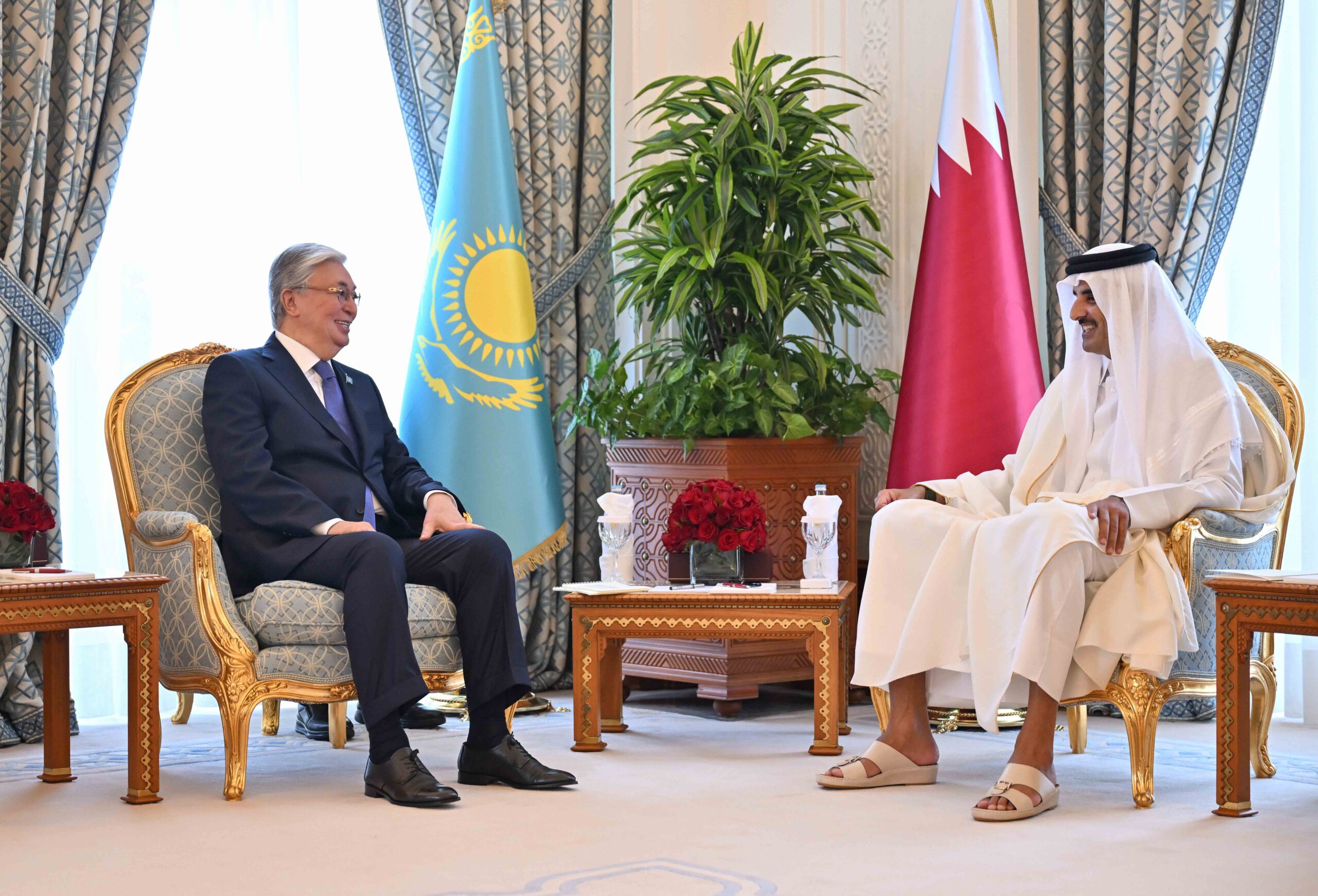
Sheikh Tamim bin Hamad Al-Thani welcomed with great pleasure the visit of the Kazakh President. Photo credit: Akorda
Since the two countries crossed the 30-year mark in their relations, Tokayev said it is time to give a new impetus to the bilateral ties.
“Qatar is our reliable and important partner in the Islamic world,” he told the Emir of Qatar, thanking him for the warm hospitality.
The Qatari leader stressed his country’s keen interest in exploring such areas as energy, trade, economic and investment projects. The two leaders noted they were looking forward to developing cooperation and bringing it to the level of strategic partnership.
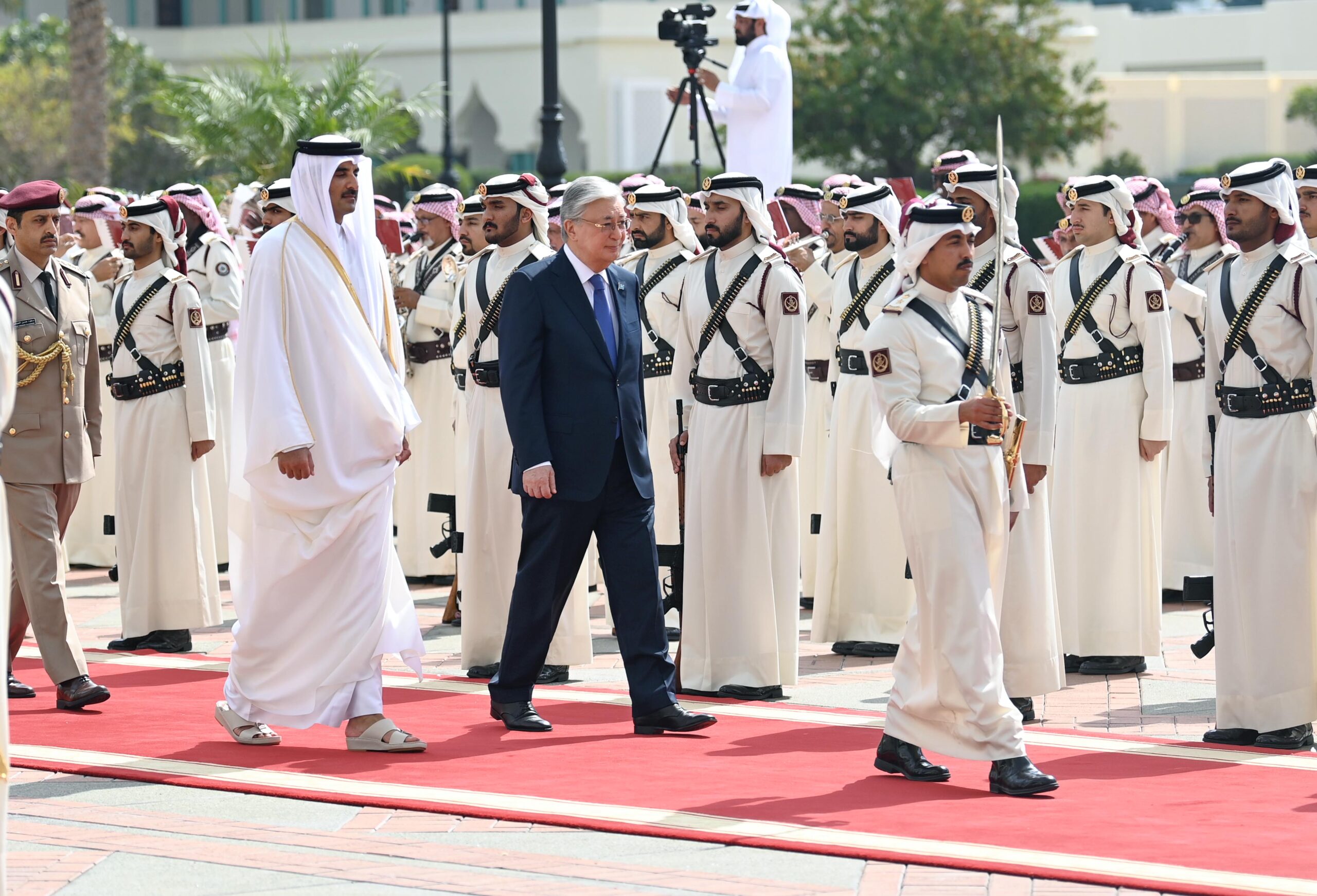
The Emir of Qatar greeted the Kazakh Leader at the Amiri Diwan. Photo credit: Akorda
Key deals signed
The investment roundtable witnessed the signing of commercial agreements worth $18 billion. This is more than half of the foreign direct investments attracted by Kazakhstan in 2022.
According to Tokayev, these agreements will “shape the strategic nature” of bilateral cooperation.
Breaking down into sectors, the energy sector stands as a cornerstone of the bilateral ties. Both nations are key players in the global energy market, with Qatar being a major liquified natural gas exporter and Kazakhstan holding vast oil and gas reserves.
UCC Holding, a part of Qatar’s Power International Holding, signed several agreements with Kazakhstan’s QazaqGas for four natural gas stations, two gas supply lines and the construction of a power plant.

QazaqGas and UCC Holding signed the agreement. Photo credit: Akorda
In a press statement, QazaqGas said these agreements envision projects aimed at the development of Kazakhstan’s gas industry.
The first part of the agreement involves the construction of two gas processing plants: one with a capacity to process one billion cubic meters annually and the other with a capacity of 2.5 billion cubic meters annually.
The second part of the agreement entails the construction of a new compressor station named CS-14 and a gas pipeline in the Aktobe and Kostanai regions.
“The project is of strategic importance and aims at gasifying both settlements and major investment projects in the Kostanai Region,” reads the company’s press statement.
The agreement also includes the construction of the second line of the Beineu-Bozoi-Shymkent gas pipeline project. This pipeline is crucial as it forms an important gas artery supplying gas to the southern and central regions of Kazakhstan.
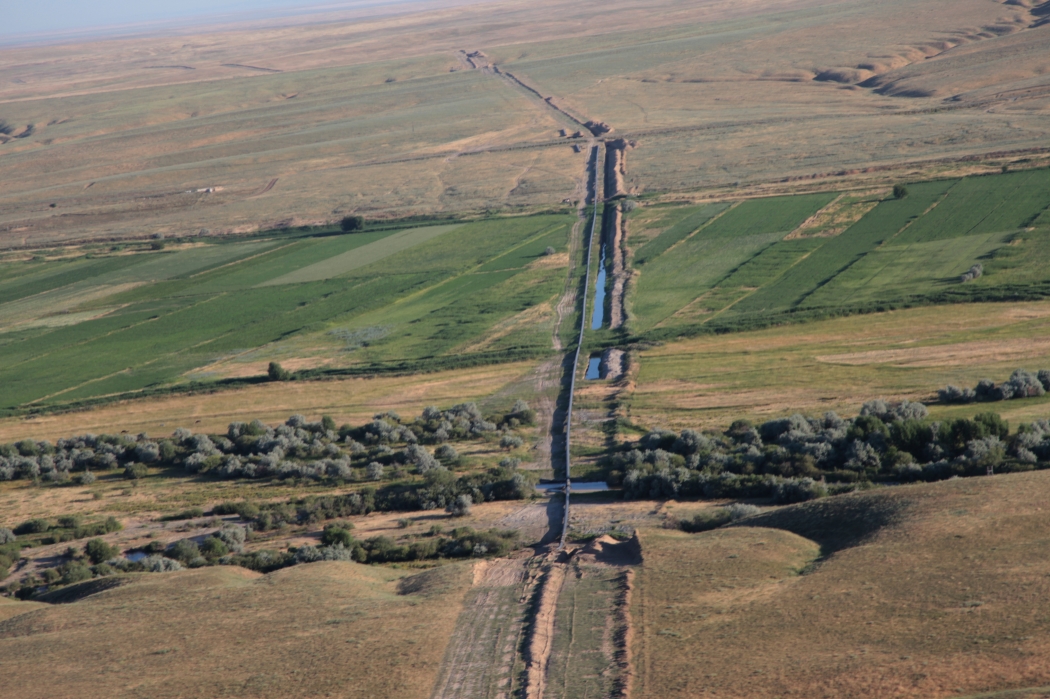
Beineu-Bozoi-Shymkent gas pipeline in the process of construction. Photo credit: bsgp.kz
The two companies also signed two agreements to build gas processing plants at Kashagan field in western Kazakhstan. The projects are aimed at increasing processing capacities and the resource base of commercial gas in the country.
“This is a very promising endeavor. We hope that negotiations for the construction of another gas processing project at Kashagan will soon yield practical results,” said Tokayev as he addressed the Kazakhstan – Qatar Investment Roundtable on Feb. 14 in Doha.
The keen interest in cooperating in the energy sector also stems from the growing risks, including the volatility of the global energy market, said political scientist Iskander Akylbayev.
“Both nations understand the significance of stabilizing the prices and ensuring a steady supply of energy sources. At the same time, I believe that their economic interdependence could improve and foster collaborations in market management strategies such as the production of investment in the infrastructure to mitigate, specifically, supply disruptions,” Akylbayev told The Astana Times.

Tokayev during the meeting with top management of Power International Holding. Photo credit: Akorda
He also sees ample opportunities in renewable energy.
“Kazakhstan and Qatar may explore opportunities for diversification investment in renewable technologies. The cooperation could extend to joint research and development of joint projects as well as investments in sustainable energy infrastructure. By aligning economic interests in global energy trends, Kazakhstan and Qatar can navigate the evolving energy landscape while maintaining regional leadership positions as key players in the global energy market,” said Akylbayev.
Other documents signed during the visit include an agreement on extradition, mutual legal assistance in criminal cases, the regulation of employment of Kazakhstan’s workers in Qatar, cooperation in the field of social protection and development as well as on the first youth program.
Kazakhstan expects that the recently ratified Agreement on Encouragement and Mutual Protection of Investments with Qatar will strengthen investment cooperation between the countries.
Trade and investments
Compared to other countries with whom Kazakhstan is trading, Qatar does not boast substantial figures. Yet, the potential is significant, and the dynamics are upward.
According to the data from the Kazakh Foreign Ministry, in 2023, trade reached $9.9 million, up from $6.42 million in 2022. In 2021, trade reached $6.3 million, a substantial growth compared to $1.9 billion in 2019.
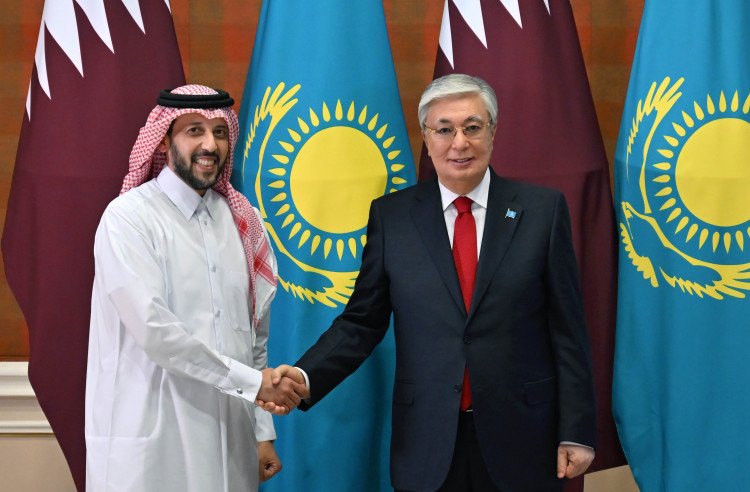
The Kazakh President met with Mansoor Bin Ebrahim Al-Mahmoud, Qatar Investment Authority CEO, discussing joint investment projects and cooperation in the financial sector. Photo credit: Akorda
One simple factor explaining the relatively low levels of bilateral trade between Kazakhstan and Qatar is geographical distance, which increases transportation costs and logistics challenges, making trade more expensive and less competitive.
During the visit, Tokayev proposed to the Emir of Qatar to increase bilateral trade up to $500 million as a first step. According to Tokayev, Kazakhstan can serve as a gateway to lucrative markets in Eurasia. The Eurasian Economic Union market alone has a total GDP of $2.6 trillion.
Promising areas
Beyond energy cooperation, there is potential for collaboration in other sectors. Agriculture, medicine, transport and logistics are among them. Both countries have shown interest in diversifying their economies.
As Kazakhstan seeks to strengthen its transit and logistics potential capitalizing on strategic location, Tokayev invited Qatar companies to take part in uncovering the opportunities from the Trans-Caspian International Transport Route, also known as the Middle Corridor.

Trans-Caspian International Transport Route passes via Kazakhstan. Photo credit: The Astana Times
The nation boasts a network of transit, transcontinental corridors, and routes. Thirteen international corridors pass through Kazakhstan, including five railways and eight auto corridors.
“We believe that Qatari companies and financial institutions can derive significant benefits by exploring business and investment opportunities in this field,” said Tokayev at the investment roundtable.
Besides agreed projects, there are ongoing projects with substantial potential, including in the health care sector. They include a multifunctional medical center in Astana to be built by Qatar’s EleganciaHealthcare and a perinatal center in the Almaty Region with 125 beds to be built by the Qatar Development Fund on a non-repayable basis.
Reforms drive investors’ interest
Reforms in Kazakhstan, particularly those aimed at improving the business environment, legal framework, and investment climate, have significantly driven foreign investors’ interest, making Kazakhstan more attractive to international businesses looking for stability and growth opportunities in Central Asia.
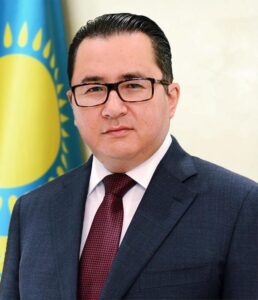
Arman Issagaliyev has been Kazakhstan’s Ambassador to Qatar since September 2020. Photo credit: Kazakh Embassy in Qatar
In his article published in the Egemen Qazaqstan newspaper on Feb. 13, Ambassador of Kazakhstan Arman Issagaliyev emphasized the importance of reforms initiated by Tokayev in driving the growing interest from Qatari investors in other key sectors of the economy.
The Kazakh diplomat has high hopes that Tokayev’s first state visit will take bilateral cooperation to a completely new level.
“The development of strategic partnerships with friendly countries will always be a priority in our foreign policy strategy. Qatar sees Kazakhstan as its main partner in the Central Asian region,” he wrote.
A bridge between Central Asia and the Gulf region
Cooperation between Kazakhstan and Qatar is also substantial at a multilateral level. Kazakhstan and Qatar are members of many organizations, including regional ones.
Notably, Qatar is a member of CICA, a multi-national forum aimed at promoting peace, security and stability in Asia, proposed by Kazakhstan in 1992. It is also a dialogue partner in the Shanghai Cooperation Organization (SCO), which Kazakhstan chairs in 2024, and a member of the Islamic Organization for Food Security (IOFS), an initiative spearheaded by Kazakhstan.
In July 2023, the first Gulf Cooperation Council (GCC) – Central Asian countries summit took place, ushering in a qualitatively new level of cooperation between Central Asia and the Gulf region. The role of Kazakhstan and Qatar, major economies in their respective regions, is crucial.
Iskander Akylbayev observes that both countries can contribute to cross-regional cooperation in many spheres such as investment, diplomacy, media, technology and telecommunications.
“Both countries set a trend for strengthening the ties between both regions and going beyond traditional cooperation mechanisms. By engaging with Qatar, Kazakhstan can actually improve its economic and diplomatic influence in the Gulf region. This engagement could provide us with opportunities for trade diversification and investment partnerships and certainly improve its international role,” said Akylbayev.
According to the Kazakh expert, Kazakhstan’s engagement with Qatar “reflects its strategic approach to diplomacy.”
“I believe that both countries can set a really good example on how to mediate and navigate in the time of growing instability, and that can actually help to normalize at least the unprecedented growing challenges that we face today,” he added.


